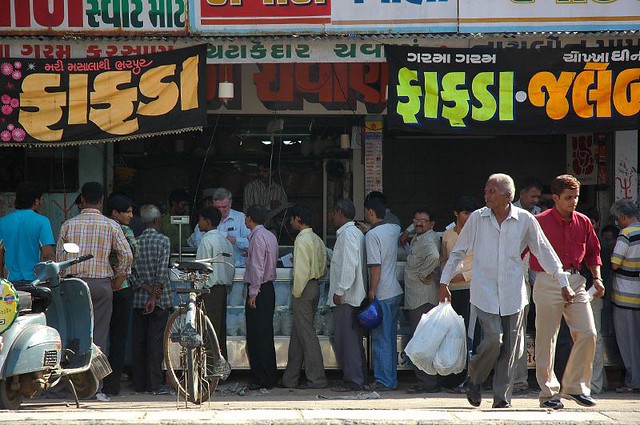With two nights to go in Navaratri 2013, as garba
enthusiasts across the state of Gujarat wistfully wish that time comes to a
halt and that the following two nights be the longest ever, there is a small
community of Gujarati’s who are desperate for the exact opposite. They just can’t
wait for Navaratri to end. They are rubbing their hands together and smiling in
anticipation. Two nights later from now, as the sun rises, it is going to be
the brightest sunshine of the year for them.
And they need to be prepared.
Wash vessels and frying pans. Stock up on flour, oil,
vegetables. Gather old newspapers. Buy a new spool of thread, polythene bags in
bulk.
The orders might
start pouring in as early as tomorrow morning.
For every man and woman in Gujarat who makes and sells fafda-jalebi for a living, it’s time for
business.
Jai Shri Ram!
Dusshera is here.
Some inestimable period of time ago, after overcoming great odds – that included mobilizing an army
of monkeys, building a bridge to Sri Lanka, uprooting a mountain in the
Himalayas and fighting sleepy giants angry at being woken up – Lord Rama finally
killed evil king Ravan to emerge victorious.
Ever since, Indians in India and indeed across the world celebrate the day every year to mark the triumph of good over evil, of satya over asatya, of love over hatred, and of course rejoice India’s first victory on Sri Lankan soil.
Ever since, Indians in India and indeed across the world celebrate the day every year to mark the triumph of good over evil, of satya over asatya, of love over hatred, and of course rejoice India’s first victory on Sri Lankan soil.
In Gujarat, as the extra-indulgent revelry of the ninth and final day of Navaratri makes
way for the quiet dawn of Dusshera, 6 crore Gujarati’s wake up and think -
“Dusshera.
Must.gorge.on.fafda-jalebi.today”
And thus every fafda-jalebi
seller, from a modest thela owner to a farsan powerhouse, right from the early
hours of the morning, finds an endless queue of people jostling for their share of “fresh” fafda-jalebi’s, waiting with an almost
religious devotion.
The farsan
powerhouses by virtue of their financial might are better prepared to meet the
massive demand. They prepare huge quantities of fafda and jalebi’s on
preceding night and have them packed in 1kg, 2kg, 5kg, 10kg plastic packets and
boxes, complete with little packets of chutney and fried chilies. And this,
they sell from temporary counters made outside
their shops specifically for Dusherra to prevent customers from
crowding inside.
On the other hand, the modest thela owner feverishly juggles between frying, preparing dough for the next batch, packing the stuff, handing it over, receiving money, counting money, handing over change, taking order, frying as he struggles to contain the queue of waiting customers. He brings bigger frying pans, engages a couple of helpers of the day.
It would be safe to assert fafda-jalebi registers its highest sales in Gujarat on Dusshera
day.
It would be safe to assert eating fafda-jalebi on Dusshera morning is a ritual.
Is unprecedented fafda-jalebi
consumption our way of paying a tribute to Lord Rama’s glorious exploits in Sri
Lanka?
It would certainly seem so.
How is it relevant to Dusshera?
But then, how relevant is spending two days flying kites with sharp glass-shredded threads, killing and terrorizing birds, screwing up electricity and telephone cables, to the yearly phenomenon of wind changing its direction?
So, never mind.
In Gujarat, Jai Shri Ram is Jai Shri *burps* Ram.
